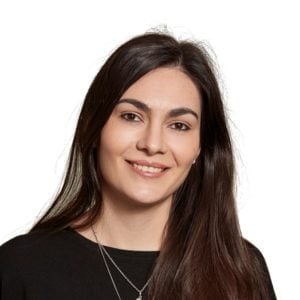Around the world, livestock is responsible for more gas emissions than every car, airplane and train put together. What changes can be made to the food production system to support an ever-growing population while also mitigating impacts on our environment?
David Sneyd is joined by Jo Raven from FAIRR Initiative to discuss the progress that is already underway to create a more sustainable system, including the rise of alternative, plant-based proteins in the food supply chain.
In this episode:
- Analyzing the risks in the current state of the food production system.
- Alternative proteins: What opportunities are there for companies, and how have consumer trends changed over the past few years?
- Details from FAIRR’s Sustainable Proteins Engagement program, including the current regulatory outlook on alternative proteins.
Related Resources
Transcript
Jo Raven: Most of the world is dependent on animal protein with factory farming being the main mode of production, but it’s becoming increasingly clear that this model is fundamentally unsustainable. Livestock emit more greenhouse-gas emissions than every car, plane and train put together, and the sector is the main driver of deforestation in the Amazon and is seen as a contributing factor in the rise of both antibiotic resistance but also novel zoonotic diseases, which means those that transfer from animals to humans, of which COVID-19 is just one example.
Michael Torrance: Welcome to “Sustainability Leaders.” I am Michael Torrance, Chief Sustainability Officer with Columbia Threadneedle Financial Group. On this show, we will talk with leading sustainability practitioners from the corporate, investor, academic and NGO communities to explore how this rapidly evolving field of sustainability is impacting global investment, business practices and our world.
Disclaimer: The views expressed here are those of the participants and not those of Bank of Montreal, its affiliates or subsidiaries.
David Sneyd: Hi, everyone. My name is David Sneyd, member of the Responsible Investment Team here at Columbia Threadneedle Investments. As part of our team’s work, we research and engage companies on many different ESG themes, but one constant through the years has been looking at how we can achieve a food-production system that is truly sustainable, being able to feed an ever-growing population whilst reducing the harms of the impacts of the current system. My guest today works for an organization with a long history of looking just at this area, as I’m joined by Jo Raven, who is Engagement Manager at FAIRR Initiative. Welcome, Jo.
Jo Raven: Thank you, David. It is a pleasure to be here with you.
David Sneyd: Great. Well, we know you guys a little bit from an investment collaboration we’ve done with you over the years, but maybe for our audience, if you could just explain a little bit about who FAIRR is and the history of why it was founded.
Jo Raven: Sure. So FAIRR is a collaborative-investor network founded by Jeremy Coller. It aims to raise awareness of the material risks and opportunities surrounding intensive animal production and the global protein supply chain. So from our London-based office, now, of course, from our homes, we support our investor members to use their influence to both safeguard the value of their portfolios and work towards a more sustainable food system.
David Sneyd: And how has FAIRR grown over the last few years? When was it founded, and kind of what’s it look like as it’s grown over that time?
Jo Raven: It is one of the fastest-growing ESG initiatives in the world. In the 4 years since Jeremy founded FAIRR in 2015, the network has skyrocketed to include support from investors managing asset over $23 trillion, and we’re absolutely delighted that Columbia Threadneedle is one of those members. When FAIRR began, the material risks of factory farming were rarely factored into company assessments or ESG research in general, but since then, we’ve witnessed the seismic shift in the conversation around how issues like antibiotic resistance, livestock emissions or deforestation that threaten the value of the animal-protein industry and create opportunity at the same time in the alternative-protein sector, interest has just skyrocketed.
David Sneyd: Yeah, certainly. I can imagine, and I think you touched on a few of them there. So from an investor perspective, what would you say was the main risk associated with the norm, as it were now, with intensive animal production?
Jo Raven: So the global population is increasing, and so is demand for protein. Most of the world is dependent upon animal protein with factory farming being the main mode of production, but it’s becoming increasingly clear that this model is fundamentally unsustainable. Livestock emit more greenhouse-gas emissions than every car, plane and train put together, and the sector is the main driver of deforestation in the Amazon and is seen as a contributing factor in the rise of both antibiotic resistance, but also novel zoonotic diseases, which means those that transfer from animals to humans, of which COVID-19 is just one example. And with consumers increasingly aware of these issues, potential taxation and regulation are on the horizon. And for example, FAIRR has estimated that 40 of the largest animal-protein companies face a loss in EBITDA of up to $11 billion US by 2015 if and when carbon taxation is extended to animal agriculture.
David Sneyd: And as with a lot of the ESG things you look at, there’s often an opportunity side and an investment approach on the opposite side of the risks, so what would you say are the opportunities associated with alternative proteins? And, actually, that might be quite helpful to actually define that for us too. What do you really mean when you’re talking about sustainable and alternative proteins?
Jo Raven: When we talk about protein diversification, it’s about encouraging the world’s largest food companies, really, to develop a global evidence-based approach to diversify protein sources away from an overreliance on animal proteins, and it’s a way of addressing climate-risk impacts within animal-agriculture supply chains but also a way of ensuring that they are capitalizing on the growing trend for healthier and cleaner eating, including the rise of flexitarianism.
David Sneyd: You may have to define that one for me. Flexitarianism, how would you define that? And, actually, just in consumer trends in general, what is it that you’re seeing in terms of globally, and also generationally, too, in terms of diet choices?
Jo Raven: So in terms of flexitarianism, it really is about eating less but higher-quality meat, and this is where the opportunity for plant and cell-based proteins are absolutely enormous. For example, we found that venture investments in plant-based proteins have already reached $1.1 billion US in 2020, which is double the total investment made in 2019. And take the milk market, for example. Plant-based milk used to be 1 percent of the total dairy market, and now they’re at 12 percent, and at the end of last year and earlier this year, we actually saw two of the biggest US dairy firms, called Borden Dairy and Dean Foods, who filed for bankruptcy and actually cited declining demand for milk and rising design for plant-based milk alternatives as major headwinds.
David Sneyd: Interesting. Thank you. And you guys recently published the latest update to your Sustainable Proteins Engagement Program, which has been going for a while now. It’d be helpful if you could give us some background on this collaboration, where it came from since 2016, when it’s founded, and what your most recent conclusions have been.
Jo Raven: Yep. So the engagement began back in 2016, and it really started with 40 investors managing about $1.25 trillion in assets, and it’s now grown tenfold to include 88 investors managing over $13 trillion in US dollars in asset in 2020, and the coalition of investors includes names like Amundi Northern Trust Asset Management and Columbia Threadneedle Investments. And the focus of the engagement is really on 25 global food retailers and manufacturers, such as Nestle, Marks & Spencer, Sainsbury’s, Carrefour, Costco, Amazon and Walmart to diversify their protein sources to drive growth and reduce risk, especially in a post-COVID and increasingly resource-constrained world.
David Sneyd: I know there’s a lot of headline conclusions that you’ve seen on tracking progress through that time, so what have been your most recent conclusions in engaging and looking at these companies?
Jo Raven: So in terms of from the progress that we’ve seen, overall we’ve been very pleased with company progress, and for the first time in the last 4 years, we’ve seen two companies actually achieve what we call pioneer status, primarily because they have been evolving their business and sustainability strategies in line with a dietary transition towards low-impact protein sources. We’ve seen these companies commit publicly to protein diversification demonstrate board-level support for a climate-aligned protein transition. They’ve carried out climate-scenario analysis on their commodity supply chains, but most importantly, both companies are exploring different ways to address consumer demand and promote long-term behavioral change beyond just increasing product choice for consumers, and these are Tesco and Unilever.
David Sneyd: Great, and your latest report has been, obviously, written during a pretty extraordinary time with all of us living through the outbreak of COVID-19, and I know you reflect on that in your report. Reflecting on all of this, what would you say about the impact of COVID-19 on food production generally, and, I think, more specifically in building this case for alternative proteins?
Jo Raven: I think today’s global pandemic has undoubtedly helped accelerate the need for a global food system transformation. It’s affected every country in the world, and it’s laid bare the underlying risks, vulnerabilities and inequities of today’s global food system, and nowhere has this been more evident than in the animal-protein industry. In fact, I think it was Goldman and Sachs that said, “Coronavirus has made oil and livestock one of the two most precarious commodities for investors next year, and COVID-19 could be the straw that could break the industry’s back.” And a key issue is that COVID-19 is just the latest in a long line of zoonotic diseases, including, for example, SARS back in 2002, H1N1, the swine flu, back in 2009 and MERS in 2012. And according to the CDC, three out of every four emerging diseases are zoonotic, and most of these come from livestock. So what biosecurity measures can the industry put in place to prevent the next zoonotic pandemic emerging? Can it ensure social distancing in meat plants, for example? And I think, as one professor recently said, “If you actually want to create global pandemics, then you build factory farms.” And what’s been really interesting has been to see how consumer perception and demand has evolved alongside this, and we’ve seen customers vote with their feet, in fact. So in the US, for example, sales of plant-based meat alternatives were up 200 percent in mid-April compared to last year, and shares of Beyond Meat have risen over 70 percent this year and at this current moment have outperformed a lot of the traditional meat-processing companies.
David Sneyd: You mentioned Beyond Meat, there. This leads into my next question, which was, as part of your report, you do highlight a lot of smaller start-up companies that are looking for different avenues on developing alternative proteins, and I guess I would ask you, the opportunity here for investors, where do you really see the long-term growth in these areas? Would it be from these more specialist players and successful IPOs, like we’ve seen with Beyond Meat, or do you think actually where the true value is going to come from is existing food producers who may already be very entrenched in the existing model, but actually have much more market presence to transition over to an alternative model and diversifying their strategies, as you say? Is that really where there might actually be better prospects?
Jo Raven: I think it’s both. On the start-up side, venture investments in plant-based proteins have already reached, as I said, 1.1 billion in 2020, which is double what it was in 2019, and I think on the Big Food side, we’ve seen large meat companies already muscle into this space. For example, the Collar FAIRR Index last year saw the number of traditional meat and dairy companies now investing in plant-based triple, and we’ve also seen a lot of established players building their internal capacity and innovation around plant-based and alternative proteins.
David Sneyd: Thank you, and just thinking about kind of the big picture here, this issue obviously touches on one that is very high on the public-policy agenda when it comes to sustainability feeding a growing population and also has a great big impact on the climate agenda and one that we’ve seen unparalleled collaboration between different nations on trying to build resilience into the way that we live. And I guess I would ask, how does the current regulatory outlook on alternative proteins look? Is it something whereby there is still very much an ingrained advantage to the pre-existing model around livestock, or is it something where public-policy players and governments are proactively encouraging diversification in this area?
Jo Raven: There is a battle in the courts over the intellectual property of terms like milk and meat. For example, in some jurisdictions now, you have to spell milk as M-Y-L-K, but so far, this has not dented consumer growth in the sector. I think the mast 6 months is proof of that. The big regulatory trends are really those to protect the climate, stop deforestation and protect public health. Most of those, as I think we’ve discussed today, have an adverse effect on animal-protein producers, and therefore create a gap for alternative proteins to come into the market.
David Sneyd: Mm-hmm, and would you say predominantly the shift here is largely down to consumer behavior as opposed to any sort of particular policy agenda? Just reflecting what you’re saying earlier with regards to at time of COVID, consumers are much more aware of the consequences of a lot of their choices. We’ve talked about that previously on this podcast, both in relation to the way industry is looking at talking more and more about ESG and actually also how it’s approaching investors, too. So I’m just wondering if you’re also feeling that’s the primary driver as we look in this area?
Jo Raven: I think it’s a bit of both. It’s a bit what comes first, the chicken or the egg? And I think what’s happened has been a bit of an evolution in how companies perceive their own sustainability challenges, as well, and I think it started with an understanding of both climate impacts caused by their own operations and also the impacts caused by their value chain and how global climate change, in turn, will then impact both the value chain as well as their operations under different warming scenarios. So I think together, both of these factors, both for companies with significant animal-protein portfolios, this provides an initial evidence base, so we’re seeing companies quantify what are their Scope 3 emissions, for example? Where is this coming from? And their value chain, and specifically animal agriculture for retailers and manufacturers is a huge source of emissions. So this is informing the approaches that they’re taking, and it’s also making them rethink and evolve existing sustainability strategies that were previously very much focused on their supply side, to actually start considering demand-side interventions.
David Sneyd: And you mentioned climate and scenarios, there. You guys in March put out the latest version of your Climate Risk Tool, which we always think it’s great when organizations like yourself put tools in the hands of investors. It makes it much easier to do our job and to actually fully understand and quantify it and talk amongst our investment teams about the real-life implications of what we’re talking about here. Could you give us just an idea of what this tool does and what it is that your analysis shows from there?
Jo Raven: Yes. The Coller FAIRR Climate Risk Tool, the purpose of it is really to help investors assess what the potential downside risks and the upside opportunities related to animal-protein companies in a two-degree world. Five years on from the Paris Agreement, we had many high-emitting sectors, from energy to extractives, all undertaking client-scenario analysis to help manage the risks that a changing climate poses to their bus, which was recommended by the Task Force on Climate-related Financial Disclosure, the TCFD. So the meat and dairy sector was an exception to this, and as of 2019, only two of 43 leading meat companies, which I think is about 5 percent, had actually undertaken a climate-scenario analysis, which is tiny compared to 23 percent of oil and gas, mining and utilities companies. And given the animal-protein sector failure to undertake this scenario analysis on climate, which is usually impactful for this sector, FAIRR really developed this first-of-a-kind tool with the whole purpose of trying to enable investors, conduct this analysis themselves, and that’s why the Coller FAIRR Climate Risk Tool was born.
David Sneyd: It’s a very good tool for us to pick up and take to the companies in which we invest and show them the results and effectively transfer this out of them, “Well, do you need to consider this further, or is there something we should be aware of here in terms of the risk of this investment?” So again, very helpful tool. Maybe in terms of just kind of pulling out a little bit in terms of FAIRR’s overall strategy, we’ve talked to a couple of organizations on this podcast who have very much embraced investor collaboration as a means by which to tackle and really push on different issues within society. And I just wanted to hear kind of your view on how you feel about the role of investor collaboration and engagement, actually, as part of your broader program, and what is it that you find is actually the advantages of approaching it in that way as opposed to other forms of advocacy?
Jo Raven: Yeah, sure. So I think engaging with companies is absolutely crucial to the work FAIRR does, and in terms of fostering change in corporate behavior, I think experience suggests that shareholder engagement gets better results than, say, divestment, for example. What is most important to FAIRR members is that this is really about materiality and not morality. They can see the fundamental risks and opportunities in this sector and want to be a candid friend to their investments to actually help them get ahead of the curve. So through our own engagements, we work with companies, and it’s all about building relationships with them to try and help them get ahead of that curve.
David Sneyd: And you mentioned earlier that you’ve seen tremendous growth in the initiative since it was launched a few years ago. Do you find that investors are starting to give greater priority to this area or if alternative proteins is something that’s increasingly on their radar?
Jo Raven: Absolutely, hence a tenfold increase in interest in our sustainable-proteins engagement, and it’s really indicative that investors now recognize the link between intensive animal-protein production, climate change and diets.
David Sneyd: And I would just leave you with this question. Looking 5 to 10 years ahead, where do you hope things will lie? Where do you hope companies are going to get to?
Jo Raven: So I think the alternative-protein sector is probably where renewable energy was 10 years ago, and just as renewables have grown from being a niche to now being a core part of global energy provision, we expect alternatives to do the same for global protein provision.
David Sneyd: Great, and if any of our listeners want to find more out about FAIRR and your recent publications, where can they go to?
Jo Raven: Yes, so I would encourage everyone to visit our website, fairr.org, and we have launched a new hub within our website called the Sustainable Proteins Hub, so you can download our report. You can download the data sheet. You can compare year-on-year results. You can also visit some of the exclusive interviews that have with founders from a lot of the leading alternative-protein companies in both Asia and other countries, so I would encourage you all to visit. So thank you, David. It’s been great to have a chat with you today.
David Sneyd: Great. Thanks for joining us today, Jo, and I wish you every success.
Jo Raven: Thank you. You, too. Bye-bye.
Michael Torrance: Thanks for listening to “Sustainability Leaders.” This podcast is presented by Columbia Threadneedle Financial Group. You can listen and subscribe free to our show on Apple Podcasts or your favorite podcast provider, and we’ll greatly appreciate a rating and review and any feedback that you might have. Our show and resources are produced with support from Columbia Threadneedle’s marketing team and Puddle Creative. Until next time, I’m Michael Torrance. Have a great week.
Woman #1: The views expressed here are those of the participants and not those of Bank of Montreal, its affiliates or subsidiaries. This is not intended to serve as a complete analysis of every material fact regarding any company, industry, strategy or security. This presentation may contain forward-looking statements. Investors are cautioned not to place undue reliance on such statements, as actual results could vary. This presentation is for general-information purposes only and does not constitute investment, legal or tax advice and is not intended as an endorsement of any specific investment product or service. Individual investors should consult with an investment, tax and/or legal professional about their personal situation. Past performance is not indicative of future results.







